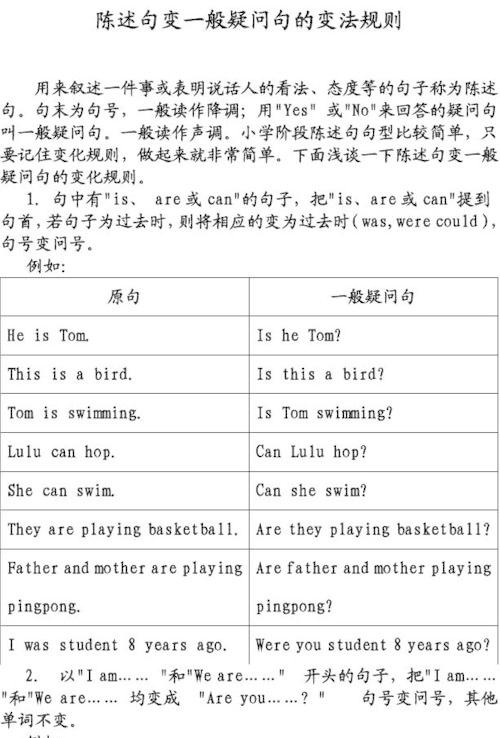学习英语中的一般疑问句回答口诀,例如"Do you...?"的回答是"Yes, I do."或"No, I don't.";"Does he/she/it...?"的回答是"Yes, he/she/it does."或"No, he/she/it doesn't."等。掌握这些口诀和技巧可以更好地理解和回答各种疑问句,提升英语水平。

口诀
- Do you...? Yes, I do. / No, I don't.
- Does he/she/it...? Yes, he/she/it does. / No, he/she/it doesn't.
- Are you...? Yes, I am. / No, I'm not.
- Is he/she/it...? Yes, he/she/it is. / No, he/she/it isn't.
- Can you...? Yes, I can. / No, I can't.
- Will you...? Yes, I will. / No, I won't.
- Would you...? Yes, I would. / No, I wouldn't.
解析
-
对于以"Do"开头的疑问句,回答时需要使用"Do"的形式来回答。如果问题是"Do you like apples?",那么回答时可以说"Yes, I do."表示喜欢,或者"No, I don't."表示不喜欢。
-
对于以"Does"开头的疑问句,回答时需要使用"Does"的形式来回答。如果问题是"Does he speak Chinese?",那么回答时可以说"Yes, he does."表示会说,或者"No, he doesn't."表示不会说。
-
对于以"Are"开头的疑问句,回答时需要使用"Are"的形式来回答。如果问题是"Are you hungry?",那么回答时可以说"Yes, I am."表示饿了,或者"No, I'm not."表示不饿。
-
对于以"Is"开头的疑问句,回答时需要使用"Is"的形式来回答。如果问题是"Is he tall?",那么回答时可以说"Yes, he is."表示高,或者"No, he isn't."表示不高。
-
对于以"Can"开头的疑问句,回答时需要使用"Can"的形式来回答。如果问题是"Can you swim?",那么回答时可以说"Yes, I can."表示会游泳,或者"No, I can't."表示不会游泳。
-
对于以"Will"开头的疑问句,回答时需要使用"Will"的形式来回答。如果问题是"Will you come to my party?",那么回答时可以说"Yes, I will."表示会来,或者"No, I won't."表示不会来。
-
对于以"Would"开头的疑问句,回答时需要使用"Would"的形式来回答。如果问题是"Would you like some tea?",那么回答时可以说"Yes, I would."表示想要,或者"No, I wouldn't."表示不想要。

